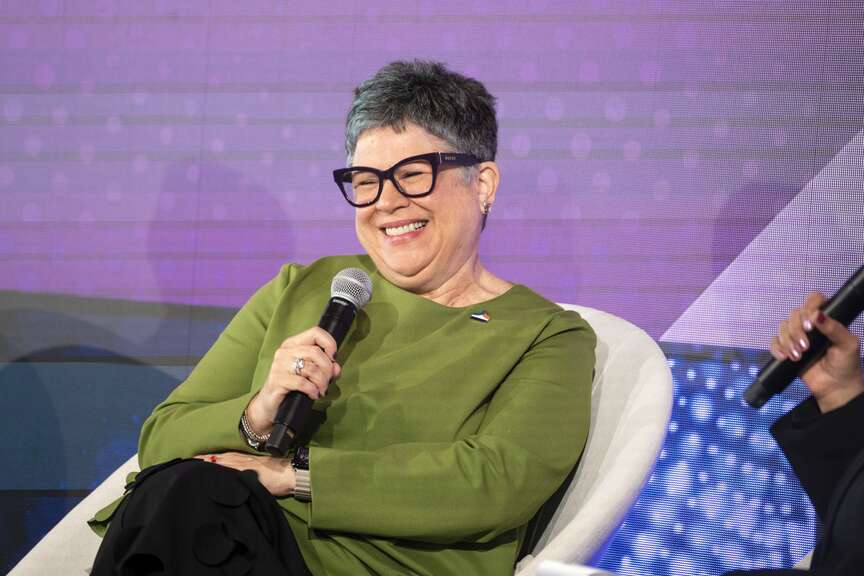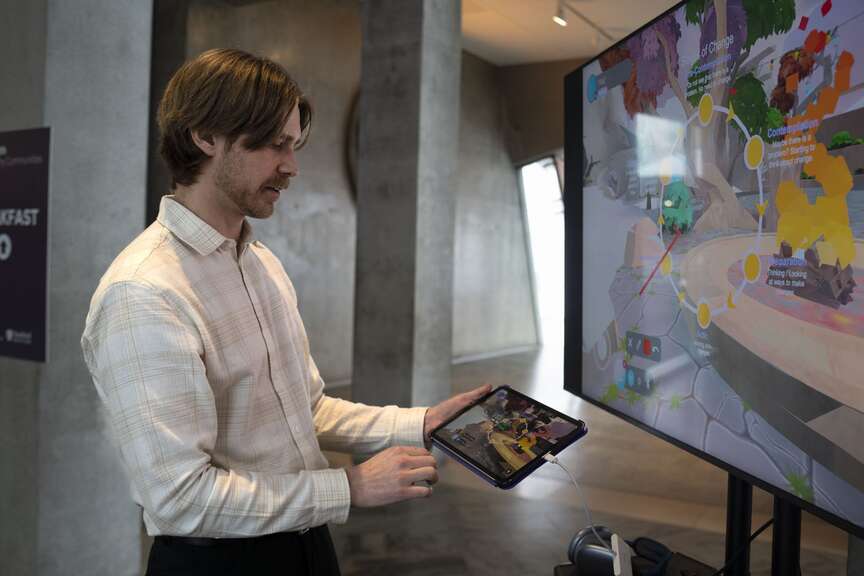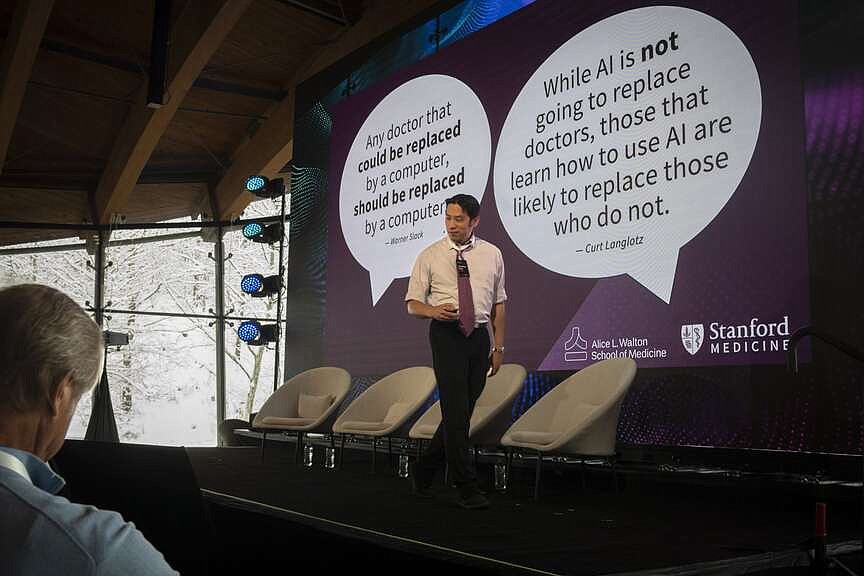Healthcare leaders are using artificial intelligence to improve health systems, but first they must overcome current barriers and limitations, health strategists say.
Walter Harris, president of Health Strategy and Delivery Arts and Wellness Enterprises, said one of the biggest hurdles is changing the narrative that robots will replace doctors.
Instead, AI tools will be used to reduce friction between patients and the healthcare system, lower healthcare costs and relieve unnecessary burden on caregivers, Harris said.
The first step to further introducing AI into the health system is educating the public and policy makers about plans to continue integrating AI into the system, he said. He added that the “Think Health: AI For Healthy Communities” conference held on January 10th is part of that first step and aims to get people on the same page about the path forward.
Alice L. Walton School of Medicine, in collaboration with Stanford University School of Medicine, hosted a conference at the Crystal Bridges Museum of American Art where national leaders in medical technology, education, and policy discussed the potential and ethical challenges of AI in healthcare.
After introductory remarks by the AI bot, an assistant professor of medicine and biomedical data science at Stanford University opened the conference with an example of how AI performed compared to doctors.
Jonathan Chen points to a study published in the journal JAMA Network Open in October that showed ChatGPT outperformed a group of doctors when asked to diagnose up to six patients per hour. It is said that the results showed that The study also found that AI software did not significantly improve doctors’ diagnostic abilities.
Physicians who used ChatGPT to aid diagnosis in this study had a median score of 76%, and those who used non-AI sources had a median score of 74%. ChatGPT performed its own diagnostics and found a median score of 92%.
Although the results showed that the robots could better diagnose patients than doctors in a simulated environment, Chen said the study had limitations because it did not mimic real life. He said the need for human doctors remains critical to dealing with complex real-world situations.
stay consistent
In addition to a consistent understanding of how AI becomes part of the healthcare system, we need a consistent model for its use with patients, Harris said. Addressing clinical care issues must be consistent everywhere, he added.
Yogi Hernandez Suárez, associate dean and professor at the Alice L. Walton School of Medicine, said that hospitals and clinics that have already implemented advanced technology in their systems and practices are working to create coherence in the health care system. He said that one example is training medical students.
The new medical school will hold its first classes in July with 48 students and will use AI simulation technology from day one, Suarez said.
Students will learn how to engage with diverse patients through scripted simulations set up in an environment enhanced by AI and other technologies, she said. Students will also get an early start at Mercy Clinic, which uses AI systems to treat patient groups, she added.
According to Steve Mackin, president and CEO of Mercy Health Systems, Mercy has deployed more than 125 AI and machine learning models across 55 hospitals.
The technology is currently working behind the scenes, much of it impacting patient care, he said at the Jan. 10 conference. One of the systems introduced is aimed at improving the transfer of patients from the emergency department to inpatient care facilities, he said. More than 225,000 such transfers will be made this year, he added.
Jim Daly, chief information officer at Washington Regional Medical Center, previously said that although some AI technologies have been available for some time, health systems consider the latest advances in artificial intelligence to be “emerging technologies.” He said that the same applies to the medical system. I plan to be careful when using it.
“Patient care is our top priority, so we must be deliberate and disciplined in how we incorporate it into our operations,” Daly said.
He said the use of AI in the Washington regional system is considered computer-assisted technology, primarily in information technology operations and medical billing and coding.
“We have established an AI governance committee comprised of clinical and IT leaders to explore how we can best leverage AI across the organization,” he said. “As we consider future uses of AI, we must focus on using it in a safe, ethical, and fair manner, with patient care as our primary focus.”
Leveraging technology
The University of Arkansas for Medical Sciences is implementing AI in research areas such as cancer imaging data management, according to the university’s website.
The University of Arkansas for Medical Sciences also has a “Creativity Hub for Artificial Intelligence in Health,” where members discuss ways to incorporate AI into both the clinical and educational aspects of care, according to a news release.
As part of the discussion, participants discussed how AI could inadvertently reinforce existing health disparities and how potential algorithms could revolutionize medicine, according to the University of Arkansas for Medical Sciences website. We are considering concerns that there may be.
The Alice L. Walton School of Medicine has embraced AI and is committed to leveraging the technology’s full potential, according to Sharmila Makhija, the school’s CEO.
A key reason the school chose Mercy as its educational partner was its innovative approach to technology and AI, she said at the Jan. 10 meeting.
Mercy opened the Mercy Virtual Care Center in 2015, making it the first center of its kind in the world. Mackin said Mercy opened the center to bridge the health care gap between rural areas and hospitals. This has led to more practice models leveraging technology and ideas for its use, he said.
Marcy’s big goal is to change the health care system by “putting control in the hands of consumers,” Mackin said.
To achieve this, Murthy envisioned an AI tool that could answer patients’ questions about what to do and where to go to get the best help, before they ever consult an actual medical professional. He said that
Currently, Mercy has a chatbot named Toni on its website that can assist patients with appointments, refill medications, and directions to Mercy stores, but cannot provide medical advice.
The ultimate goal is to give patients advanced tools on the front end so they can take the first step correctly themselves, Mackin said.
The current health care system has trained bad behavior by encouraging patients to return to the doctor in order for doctors to get paid, Mackin said.
“It’s not the patient’s fault,” he added. “It’s a bad system.”
Focusing on successful outcomes with new, larger solutions could change the process of getting things done, he said. Instead of relying on a doctor every step of the way, patients can have a smart digital guide with them at all times. This will educate patients about their health and the health care system, minimize the burden on health care workers, and reduce health care costs, Mackin said.
“That’s how we build the product,” he said.
coach bot
Thrive AI Health is a new company dedicated to developing products that act as AI health coaches, and the Alice L. Walton Foundation is a strategic investor.
Thrive AI Health was founded by OpenAI Startup Fund and Thrive Global, a company specializing in behavior change technology. According to a Thrive Global press release, Thrive Global believes that AI has the potential to improve both healthspan and life expectancy because “health is also what happens between doctor visits.”
Thrive AI Health’s AI health coach harnesses the power of generative AI to help improve health across five key, interconnected daily behaviors that determine health: sleep, eating, fitness, stress management, and connection, according to a release. The idea is to hyper-personalize and scale up behavior change.
Considering that behavior plays a large part in influencing health, people can dramatically improve their health by adopting healthier habits in these five behaviors with the help of an AI health coach. stated in the release statement.
“Recent advances in artificial intelligence present an unprecedented opportunity to make behavioral change more powerful and sustainable,” said DeCarlos Love, CEO of Thrive AI Health.
Thrive AI Health Coach is a product that solves the current limitations of AI by providing personalized, proactive, data-driven coaching across five daily behaviors, Love said.
“It will improve health outcomes, reduce healthcare costs and have a major impact on chronic disease around the world,” he said.
Alice Walton, Founder of the Alice L. Walton Foundation, Heartland Whole Health Institute, and Alice L. Walton College of Medicine We can make it easier,” he said.
“Thrive AI Health offers the potential to increase access to tools that change behavior and ultimately improve quality of life.”
AI is still a new field of technology and can do more than harm. Todd Lieber, a medical practitioner in London, said the next step in further integrating AI into the medical system requires conducting as much research as possible.
One of the main concerns going forward, he said, is whether people can trust that bots are always giving the right advice.
“Until research shows that virtual support systems become more advanced and consistently provide information on par with medical professionals, there will be concerns that AI will take full control.” he said.
 Yogi Hernandez Suárez, associate dean and professor at the Alice L. Walton School of Medicine, spoke at the AI and Speak at health care conferences. The conference will focus on harnessing advances in artificial intelligence to improve health care, according to a news release from the Alice L. Walton School of Medicine. For today’s photo gallery, visit nwaonline.com/photo. (NWA Democrat Gazette/Charlie Kaijo)
Yogi Hernandez Suárez, associate dean and professor at the Alice L. Walton School of Medicine, spoke at the AI and Speak at health care conferences. The conference will focus on harnessing advances in artificial intelligence to improve health care, according to a news release from the Alice L. Walton School of Medicine. For today’s photo gallery, visit nwaonline.com/photo. (NWA Democrat Gazette/Charlie Kaijo) Stephen Buescher speaks about Inner, a virtual peer-based mental health support group platform, at a conference on AI and Healthcare hosted by the Alice L. Walton School of Medicine and Stanford School of Medicine in Bentonville, Friday, January 10, 2025. Demonstrate the world. The conference will focus on harnessing advances in artificial intelligence to improve health care, according to a news release from the Alice L. Walton School of Medicine. For today’s photo gallery, visit nwaonline.com/photo. (NWA Democrat Gazette/Charlie Kaijo)
Stephen Buescher speaks about Inner, a virtual peer-based mental health support group platform, at a conference on AI and Healthcare hosted by the Alice L. Walton School of Medicine and Stanford School of Medicine in Bentonville, Friday, January 10, 2025. Demonstrate the world. The conference will focus on harnessing advances in artificial intelligence to improve health care, according to a news release from the Alice L. Walton School of Medicine. For today’s photo gallery, visit nwaonline.com/photo. (NWA Democrat Gazette/Charlie Kaijo)